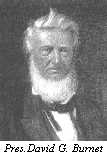 After
the fall of the Alamo, General Houston sent messages by Dr. Sutherland to
President David G. Burnet, after which President Burnet appointed him one
of his aides-de-camp, sending him a written order 1
to facilitate the retirement of the women and children over Groce’s Ferry
to the east side of the Brazos River. Having accomplished this mission, Dr.
Sutherland returned to Harrisburg, when President Burnet appointed him his
private secretary, which position he held until after the battle of San Jacinto
and peace was assured. Then he returned to his family in Tuscumbia, Alabama.
In the fall of 1837, having closed up his business in Alabama, he brought
his family to Texas, reaching the settlement known as Egypt in December. Next
year he built a home on the west side of the Colorado River, four miles from
Egypt, where he lived until the fall of 1849, when he moved to what is now
known as Wilson County, settling near the Sulphur Springs on the Cibolo River.
He was the founder and proprietor and first post master of the little town
of Sutherland Springs. A lover of education, he encouraged and supported schools
in our pioneer State for his own and his neighbor’s children, and when
he had provided his children with the best advantages available here, he sent
them off to higher institutions of learning. A devout Christian from early
manhood, he gave freely of his substance to the building of churches and the
support of the ministry. His house was ever the retreat of the wayfarer and
the welcoming home of the homeless and needy. He died at his home at Sutherland
Springs, April 11, 1867, at the age of seventy-four years and eleven months
and is buried in the Sutherland family lot in the Sutherland Springs Cemetery
which was a gift from himself to the town. Over his grave and that of his
third wife, his surviving children erected a substantial monument. He died
as he had lived, a pioneer, a patriot, a Christian gentleman. This sketch
of his life is affectionately dedicated to his memory by his grand-daughter.
After
the fall of the Alamo, General Houston sent messages by Dr. Sutherland to
President David G. Burnet, after which President Burnet appointed him one
of his aides-de-camp, sending him a written order 1
to facilitate the retirement of the women and children over Groce’s Ferry
to the east side of the Brazos River. Having accomplished this mission, Dr.
Sutherland returned to Harrisburg, when President Burnet appointed him his
private secretary, which position he held until after the battle of San Jacinto
and peace was assured. Then he returned to his family in Tuscumbia, Alabama.
In the fall of 1837, having closed up his business in Alabama, he brought
his family to Texas, reaching the settlement known as Egypt in December. Next
year he built a home on the west side of the Colorado River, four miles from
Egypt, where he lived until the fall of 1849, when he moved to what is now
known as Wilson County, settling near the Sulphur Springs on the Cibolo River.
He was the founder and proprietor and first post master of the little town
of Sutherland Springs. A lover of education, he encouraged and supported schools
in our pioneer State for his own and his neighbor’s children, and when
he had provided his children with the best advantages available here, he sent
them off to higher institutions of learning. A devout Christian from early
manhood, he gave freely of his substance to the building of churches and the
support of the ministry. His house was ever the retreat of the wayfarer and
the welcoming home of the homeless and needy. He died at his home at Sutherland
Springs, April 11, 1867, at the age of seventy-four years and eleven months
and is buried in the Sutherland family lot in the Sutherland Springs Cemetery
which was a gift from himself to the town. Over his grave and that of his
third wife, his surviving children erected a substantial monument. He died
as he had lived, a pioneer, a patriot, a Christian gentleman. This sketch
of his life is affectionately dedicated to his memory by his grand-daughter.